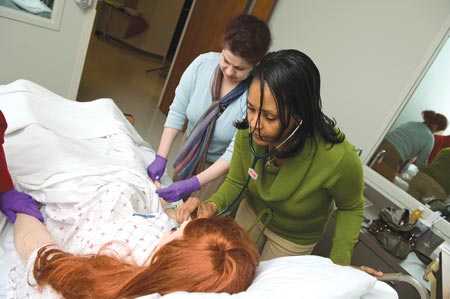Hopkins nurses train Maryland nursing faculty in simulation teaching technology
By Susan Middaugh
How can instructors give student nurses the hands-on clinical experience they need without jeopardizing patients? It’s a perennial challenge in nursing education, and Hopkins nursing faculty members have a remedy: the Faculty Academy of Simulation Teaching (M-FAST).
Maryland nursing faculty came to Hopkins for an education on teaching with simulation manikins.

With a three-year grant from the Maryland Higher Education Commission, Linda Rose, PhD, RN, associate professor, and Pamela R. Jeffries, associate dean of academic affairs, are training a critical mass of Maryland faculty members in simulation techniques. They, in turn, will train others from their respective schools.”These simulation education leaders will go on to guide the training of other faculty in their schools in a ‘train the trainer’ approach,” said Rose.
At a weeklong workshop in January, 15 faculty members representing six nursing schools in Maryland gathered at Hopkins to develop written simulation plans and evaluation criteria. By the third year of the grant, M-FAST expects to expand to nine nursing schools in Maryland and train a total of 62 faculty members.
“In the hospital, student nurses can’t be autonomous. Simulation gives them an opportunity to hone their interpersonal, clinical and problem-solving skills in a non-threatening, safe environment,” said Jeffries, a national expert in simulation in nursing education and lead author of a textbook on that topic. Jeffries directed the week’s workshop and debriefing session.
With this program, everyone wins. Students can practice what they’ve learned so their transition to a direct patient care setting after graduation is smooth. M-FAST helps participating nursing schools remain competitive by boosting their enrollments, graduation rates, and the number of nursing students who pass their licensing exams.
Hopkins instructor Kathryn Kushto-Reese, MS, RN has also used simulation in her child health curriculum for the past three years. Her goal as a student in the workshop: to develop best practices and network with like-minded faculty at other schools. M-FAST, she says, offered that opportunity.
Cassandra Hall, RN, a workshop participant and instructional associate in the skills simulation lab at Montgomery College’s nursing school, agreed. Since 2008 Hall has used manikins in class, but this year plans to tap volunteers from the college’s drama program to help her as well. As a condition of participation, she will also train 31 faculty members in what she learned. Of her experience using simulations in the classroom, Hall said, “The students love it.”